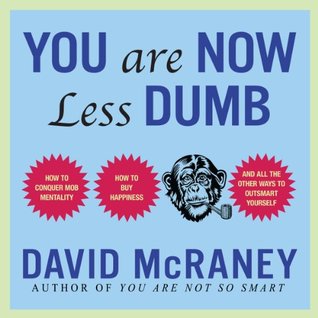
You Are Now Less Dumb: How to Conquer Mob Mentality, How to Buy Happiness, and All the Other Ways to Outsmart Yourself by David McRaneyMy rating: 3 of 5 stars
When I read You Are Not So Smart in October 2011, I gave it 5 stars. Now it’s 2018; I read You Are Now Less Dumb and gave it only 3 stars. In theory, I could have also given it 5 stars, because they’re mostly the same book, give or take some chapters (you don’t need to read this if you’ve read YANSS, or the other way around). But what has changed in the past 7 years is my stance towards David McRaney, the way he comes across and the one thing that’s strangely missing from his work, or perhaps I’m seeing it that way: humility.
I find it fascinating, and disappointing, that a book about self-delusion fails to even hint at questioning its own premise. Mr. McRaney seems to take everything and anything that comes out of the mouth of a neuro- or social scientist as gospel. His main point is that we humans are beings of flawed logic that can finally find rational salvation in the findings of behavioral science. That’s the only way, he claims, we can help ourselves overcome our cognitive biases and delusions. The underlying message is that scientific findings are 100% dependable, that scientists themselves are somehow above self-delusion, and that studying phenomena observable in a scientific setting is enough to form conclusions that can make us less susceptible to logical traps. I wonder though: is merely knowing about the results of a study enough to make one change their expectations or question their beliefs, or is deeper self-work and developing mindfulness (a.k.a. questioning the questioner) the real answer?
I realize I might come across as saying that the scientific method cannot be trusted. That is not the point I wish to make; in fact I do think many of the biases and delusions described in YANSS and You Are Now Less Dumb are fascinating and can shed a lot of light on some aspects of human and social psychology.
It’s not that I don’t believe these effects are true; it’s that I don’t think the whole picture can be painted using just scientific studies.
On one level, what about the scientists themselves? They are humans, ergo they must be susceptible to self-delusion, too. Are there stories of scientists who proved a hypothesis in a test setting that didn’t really work out in the real world? How about scientists falling victims of the Backfire Effect? That one shouldn’t be too difficult to picture. In fact, I think science and epistemology as a whole is a wonderful illustration of how grave and all-encompassing the Backfire Effect can be. And that’s just one example.
You Are Now Less Dumb would have been much better if it had included these small but important distinctions. I would have loved to read about stories of how science itself can fall into its own rational traps, like how Bill Bryson did it for A Short History of Nearly Everything and would’ve appreciated a similar approach for behavioral science and self-delusion. No such luck here.
In precisely this vain, here are two articles that would have made this book much more interesting in my opinion: the first one is on the phenomenon of WEIRD (Western, Educated, Industrial, Rich, Democratic) science and how most studies are carried out on data derived from tests carried out in colleges, a.k.a. the participants have been almost exclusively American college students. The point is that if the test subjects are all part of a very specific demographic, perhaps the conclusions of most studies cannot be counted on by to apply by default to humanity as a whole. To his credit, McRaney discussed this in this episode of the YANSS podcast, but in my opinion he vastly underplayed the importance of this finding on social psychology as a field.
Here’s a second, much more mysterious article: The Truth Wears Off–or the Decline Effect. As if everything else wasn’t nearly enough, the fact of the matter is that effects discovered in labs often cannot seem to be reproduced by other scientists, and it’s become such a fundamental, though seldom spoken-about, problem, scientists spanning many fields are talking about a very real Replication Crisis.
Again, to his credit, McRaney discussed this in an episode (episode 100, no less) of his podcast released many years after this book. Turns out that even an effect mentioned in this book doesn’t actually exist. How many more of the effects discussed in the book don’t actually exist?
“Science is wrong about everything, but you can trust it more than anything”, claims Brian Nosek, leader of the noble but misguided counter-revolution against the replication crisis. He’s right; science is the best tool we’ve got, and I’m not even being sarcastic. But what about all the existing natural effects science discounts? What are we missing that’s slipping through the cracks of lab-based reproducibility? It definitely seems like a great time to reevaluate what being a scientist means, what doing proper science actually entails. It’s high time we threw open our horizons, people, cause it’s definitely getting a bit stuffy around here.
Let me just mention Rupert Sheldrake and his fantastic work The Science Delusion, Dean Radin, Gordon White, the Skeptiko podcast and, hell, why not–while we’re at it, let’s throw some Thomas Kuhn and Paul Feyerabend in for good measure.
These could be the first stepping stones in your path to truly becoming… not less dumb–that I cannot guarantee–but coming out a bit wiser? That’s a distinct possibility!
